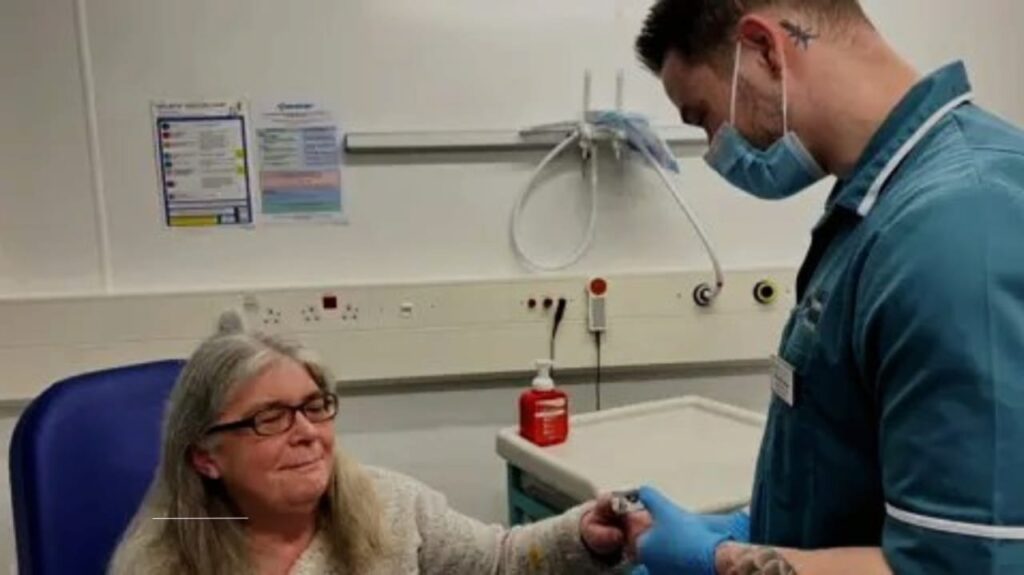
A groundbreaking cancer vaccine trial is offering new hope to patients, with one participant describing herself as “incredibly lucky” to be part of the research. Lesley Jenkins, a 65-year-old from Cardiff, Wales, is the first person in the region to trial this innovative treatment, which aims to prevent cancer from returning after initial therapy.
A Life-Changing Diagnosis
Lesley Jenkins had no idea she was living with stage 2 colorectal cancer until a routine NHS bowel screening test flagged a potential issue in April 2022. “I had no symptoms and no idea,” she recalls. The diagnosis came as a shock, especially as she was caring for other family members who were unwell at the time.
“You don’t have time to care about yourself when you’re a carer,” she explains. “I missed obvious symptoms, like losing a lot of weight, because I wasn’t eating properly and was always on the go.”
Following the diagnosis, Jenkins underwent surgery at the University Hospital of Wales to remove a large tumour from her colon. However, her journey was far from over. After recovering from surgery, she faced another setback: a Covid-19 infection and the loss of her mother, who passed away in the same hospital where Jenkins was being treated. These events delayed her chemotherapy, which she described as a “shock” to her system.
“Chemotherapy affects your whole body. It knocks the stuffing out of you,” she says.
A New Frontier in Cancer Treatment
In December 2022, Jenkins completed her chemotherapy and was offered the chance to participate in a clinical trial for a personalised cancer vaccine. Without hesitation, she agreed.
The trial, led by Velindre Cancer Centre in partnership with pharmaceutical company BioNTech and Health and Care Research Wales, uses mRNA technology—the same technology behind some Covid-19 vaccines—to create a treatment tailored specifically to an individual’s cancer.
The goal of the vaccine is to train the body’s immune system to recognise and destroy any remaining cancer cells, reducing the risk of recurrence.
How Personalised Cancer Vaccines Work
Traditional vaccines are designed to prevent diseases like measles or flu. Cancer vaccines, however, are used as a treatment after diagnosis. They work by priming the immune system to identify and attack cancer cells, which are often adept at hiding within the body.
Think of the vaccine as a “wanted poster” for cancer cells. It exposes these cells, making them visible to the immune system, which can then seek out and destroy them. This approach holds the potential to improve long-term outcomes for patients, offering a more targeted and effective treatment option.
Professor Rob Jones, associate medical director at Velindre and the principal investigator of the trial in Wales, explains that the study aims to enrol around 110 participants in Wales, with 15 other centres across the UK also taking part.
“Cancer vaccine research heralds a very promising future,” says Prof. Jones. “While it’s still unclear how successful this approach will be, on paper, it’s incredibly exciting.”
The Science Behind mRNA Technology
The mRNA technology used in this trial is similar to that employed in some Covid-19 vaccines. It works by providing the body with a set of instructions to produce specific proteins that are unique to the patient’s cancer. These proteins act as markers, helping the immune system to identify and attack cancer cells.
This personalised approach is a significant departure from traditional treatments like chemotherapy, which often affect both healthy and cancerous cells. By targeting only the cancer cells, the vaccine aims to reduce side effects and improve the overall quality of life for patients.
A Tailored Approach to Treatment
For Jenkins, the trial represents a more tailored and hopeful approach to cancer treatment. “This research is brilliant because it offers the potential of a more personalised treatment,” she says. “It’s trying to make chemotherapy more efficient and easier for the person undergoing it, targeting the cancer rather than the whole body.”
Throughout the trial, Jenkins has been closely monitored, with blood samples taken to “teach the rest of the body” how to fight the cancer. While the process requires patience, she understands the importance of accuracy in the research.
“It does take a long time, but I can see why the information has to be as precise as possible,” she says. “They’re hoping this goes further, and I’m delighted to be part of it.”
A Beacon of Hope for Cancer Patients
The trial is not just a scientific breakthrough; it’s a beacon of hope for cancer patients and their families. For Jenkins, being part of the research feels like a privilege.
“I can’t believe how lucky I am,” she says. “We’ve got this place on my doorstep, and I’m so grateful to be involved.”
Jeremy Miles, the Welsh government’s cabinet secretary for health, emphasises the importance of such pioneering research. “I want Wales to lead the way in pioneering research that has the potential to improve cancer care and treatment,” he says.
The Road Ahead
While the trial is still in its early stages, the potential of personalised cancer vaccines is immense. If successful, this approach could revolutionise cancer treatment, offering patients a more effective and less invasive option.
For now, Jenkins remains optimistic. “This trial gives me hope,” she says. “It’s not just about me; it’s about helping others in the future.”
As the research progresses, the medical community and patients alike will be watching closely, eager to see if this innovative approach can deliver on its promise.
